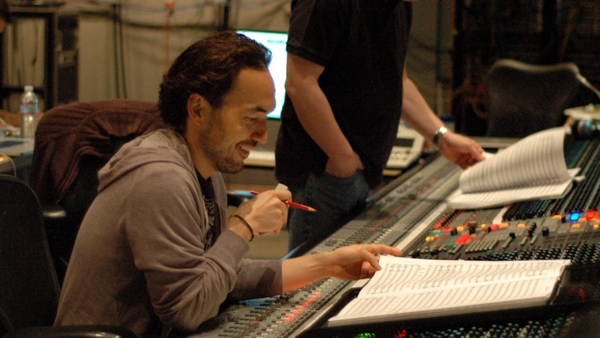 In Part I of our interview with film composer Steve Jablonsky we talked about his recent score for Ender’s Game. A major player in the word of film music Jablonsky has made a name for himself contributing to and fully scoring some of the most successful blockbusters in the last decade. Working with the likes of Harry Gregson-Williams and Hans Zimmer, Jablonsky has become an in-demand composer and he continues to score films for some of the biggest names in the industry.
In Part I of our interview with film composer Steve Jablonsky we talked about his recent score for Ender’s Game. A major player in the word of film music Jablonsky has made a name for himself contributing to and fully scoring some of the most successful blockbusters in the last decade. Working with the likes of Harry Gregson-Williams and Hans Zimmer, Jablonsky has become an in-demand composer and he continues to score films for some of the biggest names in the industry.
So jump right into Part II as we discuss Steve’s big break, scoring a slew of horror remakes for Michael Bay’s production company Platinum Dunes and of course Michael himself. Enjoy!
———————————————————————————————————————————
– Steve, let’s take a step back and talk about you getting into film scoring because there’s one thing I’m really excited to share with you. A few months back I got to speak to Harry Gregson-Williams who told me that he got his big break thanks to Hans Zimmer. Then in turn he mentioned how he gave Halli Cauthery his big break on this year’s film The East. That led to talking about some other composers who are big names today because they were either Hans’ assistant or apprentice and when I brought up your name Harry perked right up and said this:
“Well funny thing, for about 5 years Steve Jablonsky was my assistant when I was here in
LA and he was so good that I had to boot him out. I said “look, you can’t be scratching around underneath my desk like a little Mini-Me, that’s just not right. You’re too good, you’ve got to be composing”. So I told him that “as much as it pains me to give you up to the world, I have to give you up to the world”. So I did…then he went on to assist Hans Zimmer and from there he got to where he was going to go.
So yeah, I know all about that *laughs* but Hans has that sort of reputation and that’s what he likes to do. Although I’ve remained very close contact with Hans, he’s a great friend of mine and always will be, I don’t have anything to do with his studio any longer and I haven’t for about 12 years now so I don’t know the ins and outs of who the new blood are coming out through his place. It’s expanded quite a lot since I was there.”
*laughs* That’s hilarious *laughs” Well he’s right. I had been a fan of Hans forever and I actually thought that I would be a recording engineer, not so much a composer. I never set out specifically to compose music for film although I had a little studio at home that I messed around in and I enjoyed writing music, but it didn’t seem like a real possibility that I would be doing films. But I knew something about the recording side of it and I called Hans’ studio back in 1996 and asked if they needed any help and the studio manager at the time said to come on down because it was a good time.
Right now Hans has sort of an empire. He calls his place Remote Control and he owns half a block at this point but at that time it was one small building and then half of another small building and that was it. When I started there it was much more intimate and it was great for me because Harry had just come over from the UK to help Hans. But Harry needed an assistant and I was right there at the right time and the studio manager was kind enough to suggest me, so that’s how I got that job. I was just helping out here and there, then a little bit turned into a lot. It was mostly technical at first, plugging things in, like you said scratching around the floor for whatever, but then whenever Harry wasn’t in his room he was nice enough to let me mess around with his studio, which was obviously way nicer than mine at home, so I would take a scene from whatever he was working on and score it just for fun you know.
I was just messing around with these really great sounds that he had and then he began asking me to write a cue here and there and that just kind of snowballed into me doing my own writing. But I was still doing all the technical stuff too, which I was happy to do, it just meant that I never went home for pretty much 4 years. *laughs* But he was so great to watch and I learned a lot writing for him and he would come in and say “that’s good but maybe you should do this and this and this” so he was a great teacher and he’s totally right, one night I had been been writing all day and was staying all night to record and so it was the next day where he said “look you have to write, you can stay if you want but you really need to do your own thing”. It was a really nice thing for him to do so we agreed that I would do that and we brought somebody else in to take over and help him during that transition.
At that time Hans’ company offered me a room of my own to write in. They had a commercial company and I was going to write for some commercials, just whatever little things they needed, but I ended up writing for Hans. Obviously Harry and Hans talk a lot and Harry was probably like, yeah this guy’s good you should try him out. I think one of the first things I did for Hans was an arrangement of Driving Miss Daisy for the concert he did in Gent many years ago.
He was thrilled with it because Driving Miss Daisy was all synth so there were no actual music parts for any of the score, he did it all on his computer, including the clarinet and all that. So there was no sheet music we could hand to the orchestra and so I had to create that. I did my own arrangement of his piece by listening to the CD, that’s all I had, and he was like “wow, this is great” and asked if I wanted to write on Hannibal, the Ridley Scott movie and I said “yeah, sure, Mr. Zimmer” *laughs* so I did some cues on that then he asked me to write on other films but the big one I think for me was Pearl Harbor because I did quite a few cues on that.
Writing on that led me to Michael Bay hiring me to do The Texas Chainsaw Massacre remake. One of the guys who was working on that behind the scenes named Bob Badami was the music editor, another was Pat Sandston who was one of Jerry Bruckheimer’s partners. Now I don’t think Michael knew exactly what I was doing on Pearl Harbor, I mean he saw me around but he didn’t necessarily know me or that I was writing, but those two guys both told him when he started Platinum Dunes that they didn’t have a lot of money but they were looking for someone to do the music for it.
So they said, “How about we give Steve a shot?” Just like how Harry helped me get to the next level, these guys said “you should give Steve a shot, he did some great stuff on Pearl Harbor, whether you realize it or not”, so he did and I did that, and at the end of the project, I love quoting Michael, he looked right at me after we did the final playback of the movie and said “Wow you did a great job and we paid you nothing” *laughs* and everybody in the room laughed, and I just smiled and said “you’re right”.
It was a great opportunity for me obviously and for whatever reason he liked that so much he offered me The Island to score, and that was the beginning of it all. I guess everyone’s got some story of how they were helped by someone else. If Bob and Pat didn’t help me get my chance I wouldn’t have done The Island probably or Transformers, or any of that. But between Pearl Harbor and, The Texas Chainsaw Massacre, right in there is where things began and just kept growing exponentially.
– The Island is great. I love that movie and it’s such a sensational score. Tracks like “My Name Is Lincoln” and “The Island Awaits You” are just exceptional.
Well thanks, that was great but I was petrified because that was the first big project of mine. I was
intimidated working on Texas Chainsaw Massacre but The Island was the first big studio release and with Michael Bay behind it nonetheless. So that was one level of pressure and I just wrote music the best I could, trying to survive you know? But I think he did such a cool thing with that movie. That opening piece, “The Island Awaits You”, kind of wrote itself because he showed me that dream sequence and I immediately heard these ideas and I went and wrote it fairly quickly. He really liked what I came up with, but that all came from what he showed me. Had he filmed it differently the score might have been something completely different so I get my inspiration from the director and all the scenes and everything. Again it’s a collaborative effort but I guess I survived The Island because Michael asked me to do more movies for him. *laughs* You just try to survive on these big Michael Bay pictures, and if he asks you back, you know you’ve made it.
– Well I don’t think he’s not going to ask you back, you sort of cut your teeth and earned your stripes with him. But I guess we’re at the “elephant in the room” part of the interview and the next two words kind of say it all: Michael Bay. Can you even describe what it’s like to work with him?
*laughs* It is hard to describe. *laughs* We like to use the phrase, “it’s Michael Bay’s world and we just live in it”. It’s a common phrase, people use it for different things and different people, but when we’re on the project with him it’s a wild ride. At this point in my career we have a very good relationship and I know the things he wants and if he likes something one day and then doesn’t like it the next day, I know not to freak out. You just sit back and think, did he listen to this on his jet and did it just sound bad on his headphones? I really have to dig to make sure he doesn’t like something because he has such a crazy life and a lot of times I’m not sitting with him in a room when he’s hearing stuff, and I really have to be careful.
I mean if you’re on an airplane and you’re listening to something with headphones, sure it’s not going to sound as big or important as if you were in my studio. He has so many things on his plate he might only have a minute to listen to a piece and I’ve actually been asked that by his people. They’ll say “the only chance that Michael has to listen to the cue is on his airplane” because he’s on his way to China or something. And I know now to say “absolutely not, I’m not handing this over so he can listen to it on his iPod. It’s just not going to happen, it’s not fair to him, it’s not fair to me and it needs to be presented properly”.
It’s just a unique experience with someone that big and powerful. His life is just crazy but we find ways to make it work. One good thing is that he goes back and forth to Miami a lot; he works there, he has a house there, he loves it there. I know he has a really nice set up so we’ll get on a conference call and he’ll listen to music at his house and we’ll just talk it through on the phone and that’s what I mean by I am just living in his world, whatever he needs me to do I just do.
I used to freak out if he was having a bad day and didn’t like anything I sent him. Mostly it’s just because he’s so stressed. But now I know to just take a step back, don’t freak out and rewrite everything, just give it a day and present it again or whatever. It’s always an interesting process with him because you never know what his personal situation is at any one moment. He’s working on so many things, especially now, he’s got all these TV projects as well so I will call and say I’ve got some music for him to listen to and they’ll tell me he’s out somewhere shooting this pilot. So you just kind of grab him when you can but once I have him in a room it’s great. You can play music and get total one on one time with him. He’s not one to ever flip out and go “this is amazing!” but if you get “that’s pretty cool” then you know you’re on the right track. In Michael Bay speak, “pretty cool” is very good.
Having said all that, he’s such a loyal guy to me in that he just keeps letting me do these films. I will never get anything from him where he’s jumping up and down in excitement, but I’m always just hoping that he really does like the stuff. It’s usually at the premiere where he will come up to me, almost without fail, and say “you did an amazing job”, and then I really know he actually does like it. I think it’s just the only time he’s able to relax and stop for a second. He’s a person who takes on these projects that are so huge and massive but he’s so focused on everything and every aspect of it from the sound design, to the CG, I mean he flies up to ILM one to three times a week. He told me “look I have to do that because I need to be part of it. I can’t do it over conference call, I need to sit there with them. These hundred animators show me what they have and I’ll say that looks good, or tweak this here”. Michael really is into everything you see on the screen and he has such a hand in it all so that’s why his schedule is so crazy.
He may only have a few minutes because he’s had 20 meetings all day and he’s burned out by the time I see him. So I may have ten cues to show him but I see that he’s burned out so I will only show him five and save the others for another day. It’s a big part of
what I do, I just read his situation, what’s best for him and what’s best for me. But you hope that you can get him for an hour and just talk about life with him for a few minutes, get him relaxed so he’s not just having to run off into another meeting. I suppose this is the case with other filmmakers who operate at this level but I think it’s the fact that he’s so hyper-focused on every little thing that’s in his movie so that makes him have to be in five hundred places at once and it’s just something he does and he does it somehow.
But at the end of the day he’s really given me huge opportunities. Now nobody gives a composer a stage like him because you know everyone on the planet is going to go see Transformers 4. It’s rare that people hear the kind of music I do outside of film. It’s one of the few places people will hear orchestral music these days. There aren’t a lot of young people running to the symphony halls and listening to Beethoven, they are into the film scores, so he gives me these huge audiences because he has such a huge audience already, and I am forever grateful to him for that. People like yourself hear Transformers and The Island because he’s giving me these wide audience is to play to. It’s great for any composer really.
– Well in addition to Bay repeatedly coming back to you because he knows you’re a good composer and you have a good relationship, how would you say he’s influenced you or challenged you? Also, how do you see yourself growing from film to film?
That’s a good question, I think with each Transformers film he’s wanted something different and he’s always had this kind of specific theme where he’ll really want something special so he gives me these goals to reach, “this needs to be really emotional”, “this needs to be really kick ass”, and he always gives me new challenges. With Transformers 4 I haven’t had that many conversations with him, but I get the feeling that he wants something wildly different. Having said that we might use some of the old themes, though I’m not sure because it’s Mark Wahlberg now and a whole different cast, so we might just do something very different. The bottom line is Michael is paying me to make his films better. Whatever ideas he’s got, I’m going to listen to them, and fortunately he’s got these great ideas.
Because he’s so creative, he’ll tell you he knows nothing about music but he may not be able to talk about notes and rests and things but he’s all about feel. A lot of people say my music sounds really epic, and with Michael it’s better to be epic because if he’s not feeling it, it’s not gonna work. I’ve heard him say that a lot before, “I’m just not feeling it”. And I get that, he doesn’t need to say anything else, I understand it. He has such a good sense of what audiences want, and I know critically he gets trashed and I don’t get it, it’s just not fair, because ultimately you want to please the audience, you don’t give a damn about the critics and that’s what he’s good at. So if he’s not feeling something I know it’s just not working yet, it needs to be more this or that so I keep working it and working it and if he’s happy then I know it’s probably at a level where it’s going to be effective in the movie and people are going to dig it.
He’s very good at pushing me a little further each time. He doesn’t like to approve something immediately. He’ll never say it’s great, he’ll say it’s good but there’s room to improve it. He’s always trying to push it a little farther and I don’t think that’s just me, I think it’s every part of the movie. He always wants you to just keep pushing it, and you might reach a point where you go “look I don’t know what else I can do with this” and he might at that point go “okay, yeah this is where we need to be”.
I fully expect on Transformers 4 whatever we do he’s going to want something wild and to go down some road where we use some crazy instruments or something. I don’t know yet, we’ll see what happens but he’s very adventurous in his creative process so I’ve learned that from him I think. He loves electronic stuff mixed in and that’s really where I got a lot of experience and now it’s part of my sound, I guess, because I get asked to do it a lot. I record a lot of things and then manipulate them in my computer and I really enjoy doing that that – combining it with the orchestra to make something new – and he loves that sort of thing, hearing sounds he’s never heard before.
I will often start a project and record whatever it might be, just some instrument, or it doesn’t even have to be an instrument, it could be a car, but I’ll manipulate it on my computer so it sounds like an instrument or something and he’ll go “that’s cool, I like that”. Filmmakers really respond to this, I mean how many movies have been made to this point and how many scores have been written?
It’s kind of difficult to do something brand new with traditional scores so a lot of times I take more of a sound design approach and he responds to that a lot so it pushes me to be really experimental with recording and processing all sorts of things to turn them into something new. It’s become a part of my sound and a big reason is because of him. I do that a lot now even if I’m not asked to because it’s fun to come up with a sound you’ve definitely never heard in any other film because you’ve just made it two seconds ago.
———————————————————————————————————————————
Click here to read Part III, the conclusion of our 90 minute session with prolific film composer Steve Jablonsky.
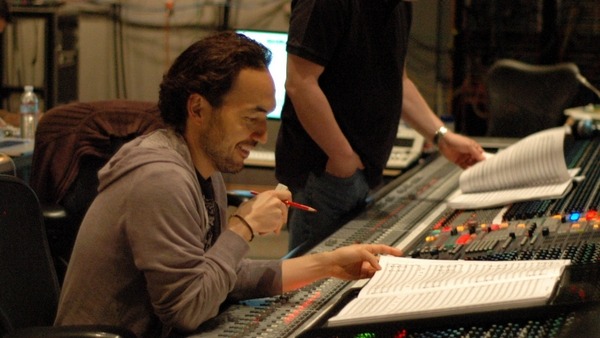
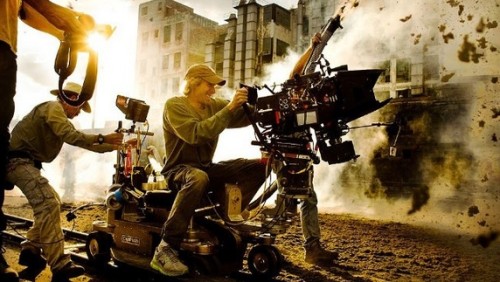
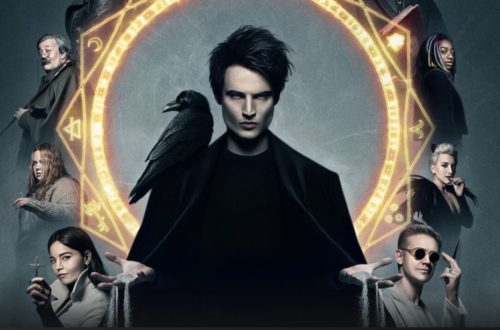
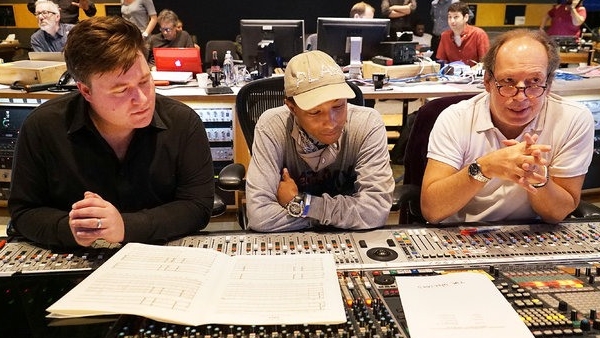
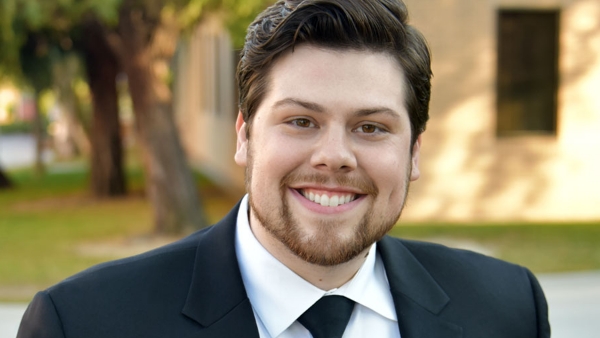
4 Comments
Fillip
That was a great read. Job well done.
As far as I’m concerned Jablonsky is the new Hans Zimmer. Clean and clear. The other MV/RC composers are also quite good but there’s something about Jablonsky…something more. It’s no wonder that he’s so popular now and has such a huge fanbase. Come to think of it he’s just like Michael Bay – critics and militant film buffs tend to trash his work but the ordinary audience loves his work. And as we all know the audience is what matters at the end of the day.
Like most people I love Jablonsky’s scores for The Island and the Transformers films but I have to say that Pain and Gain is also an exceptional score. Sure, it’s not as big and epic as Transformers but it’s equally powerful and memorable. The track that plays at the end when Mark Wahlberg and Ed Harris arrive in Miami is simply amazing. Love every second of it.
And last but not least my hat’s off to Michael Bay for being so loyal and giving Jablonsky a chance to prove himself with The Island. As a huge fan of both guys I’m looking forward to their next project.
Again, good job with the interview. It’s probably the best Jablonsky interview so far.
RidgeRacer4
Thanks for the comment Fillip. Been a fan for years and Steve’s work just gets better and better. Excited to hear the sound he brings to T4 and anything else coming his way in the future. Glad you liked the interview, Steve was so gracious with his time and offered such incredible insight into his work and on scores I really do love so it was just an honor to talk with him. Hope you like Part III as well (it’s up now).
Bob- Sydney Aust
Pretty cool interview ! One question I’d like to know is how loud does Steve play his music ?
RidgeRacer4
I figure he plays it loud enough to hear all the nuances of the orchestra…but also loud enough to be heard over all the explosions and “bayhem”;)